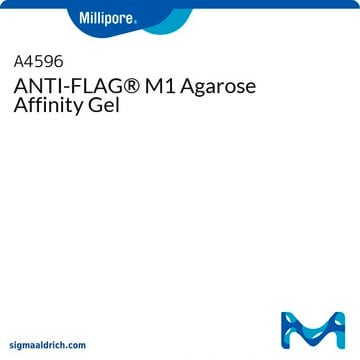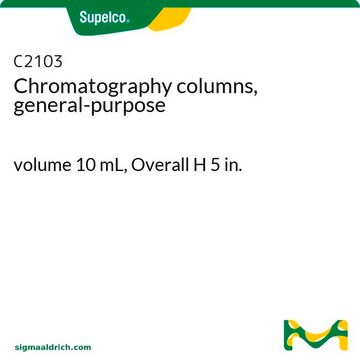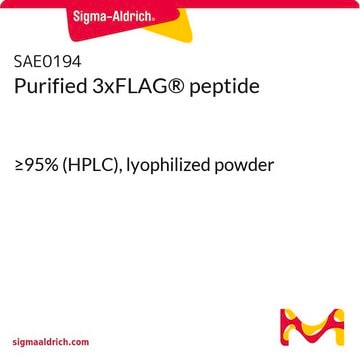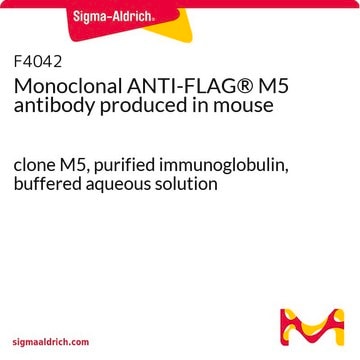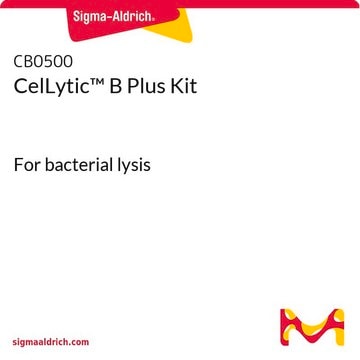CELLMM2
FLAG® M Purification Kit
For Mammalian expression systems.
Synonym(s):
Anti-ddddk, Anti-dykddddk
Sign Into View Organizational & Contract Pricing
All Photos(1)
About This Item
UNSPSC Code:
12352200
NACRES:
NA.32
Recommended Products
Application
The FLAG Purification Kit utilizes CelLytic™ Reagents for rapid and efficient cell lysis and protein extraction and ANTI-FLAG® M2 affinity gel for affinity purification of active FLAG fusion proteins.
Learn more product details in our FLAG® application portal.
Learn more product details in our FLAG® application portal.
Features and Benefits
- Includes ready to use reagents, columns, and a detailed protocol for affinity purification of FLAG fusion proteins.
- ANTI-FLAG M2 Affinity Gel allows efficient binding of FLAG fusion proteins without the need for preliminary steps and calibrations.
- Two alternatives for efficient elution conditions (by acidic conditions or by competition with FLAG peptide).
Packaging
Sufficient for 3-5 uses of 1-ml affinity purification column.
Other Notes
Kit contains CelLytic™ M for cell lysis and protein extraction from Mammalian cells.
Legal Information
ANTI-FLAG is a registered trademark of Merck KGaA, Darmstadt, Germany
CelLytic is a trademark of Sigma-Aldrich Co. LLC
FLAG is a registered trademark of Merck KGaA, Darmstadt, Germany
Kit Components Also Available Separately
Product No.
Description
SDS
- C2978CelLytic™ M, Cell Lysis Reagent, Suitable for Mammalian cell lysis and protein solubilization.SDS
- SAE0194Purified 3xFLAG® peptide, ≥95% (HPLC), lyophilized powderSDS
- A2220ANTI-FLAG® M2 Affinity Gel, purified immunoglobulin, buffered aqueous glycerol solutionSDS
- C2103Chromatography columns, general-purpose, volume 10 mL, Overall H 5 in.SDS
Storage Class Code
10 - Combustible liquids
Certificates of Analysis (COA)
Search for Certificates of Analysis (COA) by entering the products Lot/Batch Number. Lot and Batch Numbers can be found on a product’s label following the words ‘Lot’ or ‘Batch’.
Already Own This Product?
Find documentation for the products that you have recently purchased in the Document Library.
Customers Also Viewed
Takeshi Into et al.
Molecular and cellular biology, 28(4), 1338-1347 (2007-12-19)
Nitric oxide (NO) has been thought to regulate the immune system through S nitrosylation of the transcriptional factor NF-kappaB. However, regulatory effects of NO on innate immune responses are unclear. Here, we report that NO has a capability to control
M D Mostaqul Huq et al.
Molecular & cellular proteomics : MCP, 6(4), 677-688 (2007-01-09)
Retinoic acid receptors (RARs) belong to the nuclear receptor superfamily. The mechanism of ligand-dependent activation of RARs is well known. The effect of protein phosphorylation on the activity of RARs has also been demonstrated. However, it is unclear whether other
Severa Bunda et al.
Proceedings of the National Academy of Sciences of the United States of America, 111(36), E3785-E3794 (2014-08-27)
Mutations in Ras GTPase and various other components of the Ras signaling pathways are among the most common genetic alterations in human cancers and also have been identified in several familial developmental syndromes. Over the past few decades it has
Koji Ikeda et al.
The Journal of biological chemistry, 279(53), 55315-55323 (2004-10-22)
Cell adhesion molecules regulate a variety of endothelial cell functions such as migration, response to inflammation, and angiogenesis. Recently, activated leukocyte cell adhesion molecule (ALCAM), a member of the Ig superfamily, has been detected in the primitive subsets of hematopoietic
Erik G Puffenberger et al.
PloS one, 7(1), e28936-e28936 (2012-01-27)
The Clinic for Special Children (CSC) has integrated biochemical and molecular methods into a rural pediatric practice serving Old Order Amish and Mennonite (Plain) children. Among the Plain people, we have used single nucleotide polymorphism (SNP) microarrays to genetically map
Our team of scientists has experience in all areas of research including Life Science, Material Science, Chemical Synthesis, Chromatography, Analytical and many others.
Contact Technical Service






